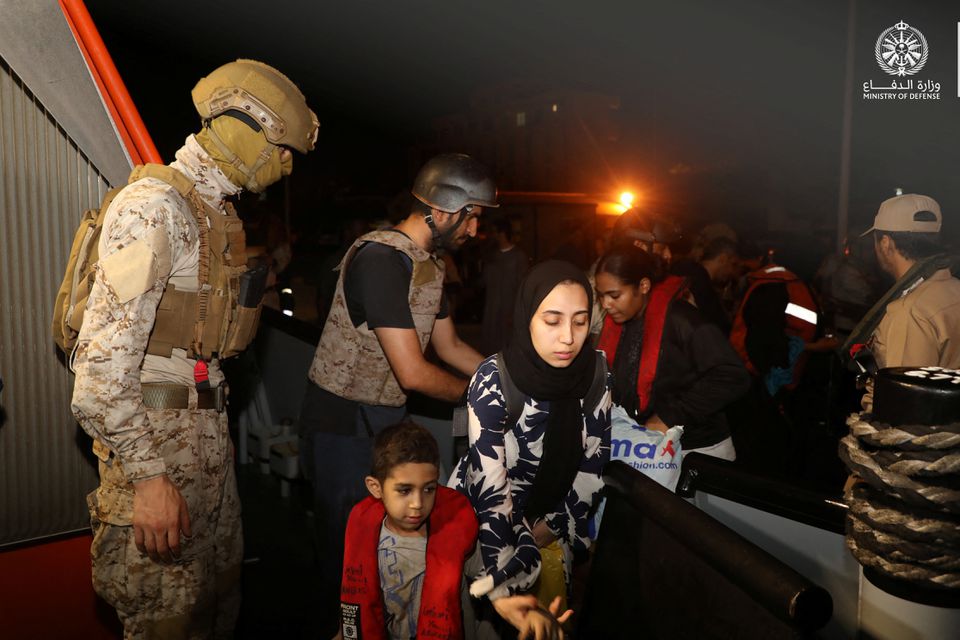Uncategorized
Explainer: South Korea’s nuclear dilemma: Would U.S. trade Seattle for Seoul?
On Wednesday, U.S. President Joe Biden will meet with South Korean leader Yoon Suk Yeol to reassure South Koreans that the nuclear umbrella will defend them from North Korea.
With North Korean missiles now threatening the US, an old Cold War conundrum has resurfaced: would the US risk nuclear retaliation against itself to defend an ally?
WHAT’S WORRYING SOUTH KOREA?
North Korea would risk severe U.S. retaliation if it attacked South Korea with nuclear weapons, under U.S. “extended deterrence” protection.
After Pyongyang detonated a nuclear bomb in 2006, this was a credible danger because North Korea had few bombs and little ability to export them.
However, it now has intercontinental ballistic missiles (ICBMs) that may reach U.S. cities, making defending South Korea more expensive.
After former President Donald Trump questioned the value of the South Korean alliance, many South Koreans now support their country developing nuclear weapons.
Last month, 64% of South Koreans supported this, something the Biden administration opposes.
South Korea’s options?
Yoon campaigned to redeploy U.S. tactical nuclear weapons in South Korea and maybe “nuclear sharing,” or shared command of U.S. weapons. He suggested in January that Seoul might soon create a nuclear weapons given its scientific expertise.
Yoon retracted his comments about a South Korean bomb and said his administration was dedicated to the nuclear non-proliferation pact (NPT).
His remarks have sparked a debate that one former senior U.S. defense official said may mainstream a South Korean nuclear arsenal.
BIDEN-Yoon Summit Expectations
Senior U.S. sources said Biden will pledge “substantial” actions to reinforce extended deterrence to offset such views. One official stated a “Washington Declaration” will create a “Nuclear Consultative Group” to allow South Korea “a voice in those deliberations” on U.S. major contingency plans.
Another remarked, “Our absolute and enduring commitment to provide extended deterrence to (South Korea), including, as necessary, a decisive response,” was the goal.
The leaders will announce regular strategic asset deployments, including the first U.S. nuclear ballistic-missile submarine visit to South Korea since the early 1980s, to demonstrate deterrence.
The officials emphasised that there was “no vision” of restoring U.S. nuclear weapons to the Korean peninsula and that the U.S. president had exclusive control over their use, while Seoul would reaffirm its NPT commitment and non-nuclear status.
WHAT WOULD NUCLEAR SOUTH KOREA MEAN?
In January, nuclear expert Siegfried Hecker warned that Seoul acquiring a bomb would encourage North Korea to construct a larger arsenal and likely lead to severe economic sanctions on South Korea.
He said that despite South Korea’s technical expertise and civilian nuclear program, building a nuclear weapons would take years and end its U.S. alliance and nuclear umbrella.
It would also endanger global non-proliferation.
“South Korea would be the first democratic country to withdraw from the NPT, dealing a blow to decades of U.S. leadership in preventing nuclear proliferation,” Hecker added. “Washington would have no choice but to condemn and counter the South’s decision to build the bomb.”
“The South can have its own nuclear arsenal—at enormous price and sacrifice—or cooperate with the Americans to remain under the nuclear umbrella with American soldiers stationed on the peninsula. It’s either/or.”
Reporting by David Brunnstrom in Washington; additional reporting by Josh Smith, Soo-hyang Choi, and Ju-min Park in Seoul; editing by Don Durfee and Michael Perry
Uncategorized
Israeli attacks in Gaza add to the heavy Palestinian toll in the war on Hamas.
Israeli attacks in Gaza add to the heavy Palestinian toll in the war on Hamas. Israeli forces bombarded the central region of Gaza by land, sea, and air. Palestinian officials claimed scores more casualties, and the United Nations health agency stated that thousands of Palestinians were attempting to leave the fighting.
Israel has not wavered in its determination to eradicate the Palestinian militant group Hamas as a reaction to the terrorist organization’s attack on Israel on October 7. This is the case, although international requests have been made for a ceasefire and an improvement in the deteriorating humanitarian situation in the Gaza Strip.
Late on Wednesday, medical personnel reported that Israeli aircraft had carried out three attacks in the Al Nuseirat neighborhood of central Gaza, resulting in the deaths of seven people and injuries to numerous more.
The World Health Organization of the United Nations said that its personnel had witnessed tens of thousands of civilians escape severe strikes in Khan Younis and the Middle Area by walking, riding donkeys, or driving into vehicles. A statement made on Wednesday stated that improvised shelters were being constructed along the road.
On the diplomatic front, where international pressure on Israel has increased, French President Emmanuel Macron sent a call to Israeli Prime Minister Benjamin Netanyahu, in which he emphasized the necessity of working for a truce that is both long-lasting and sustainable with the assistance of regional and international allies, according to the French Presidency.
An Israeli bombardment on Wednesday near Al-Amal Hospital in Khan Younis, which is located in the southern Gaza Strip, resulted in the deaths of twenty Palestinians, according to a statement released by the Gaza Ministry of Health. Immediately after the incident, the Israeli military did not provide any remarks.
Medical personnel said that one airstrike resulted in the deaths of five Palestinians in the Al-Maghazi region of central Gaza. Meanwhile, health authorities reported that seven Palestinians’ bodies arrived at Al Shifa Hospital in Gaza City, which is located to the north as well.
As night fell, residents in the central Gaza Strip said that Israeli tank bombardment intensified east of Al-Bureij and Al-Maghazi, which is the area where tanks have been attempting to force their way through.
An increase in Israeli Army casualties
The Israeli military said on Wednesday that three more troops had been killed in action in Gaza, raising the total number of military casualties to 166 since the beginning of ground operations on October 20.
On October 7, the worst day in Israel’s history, Hamas carried out a cross-border rampage that resulted in the deaths of 1,200 people and the kidnapping of 240 hostages. This led to the outbreak of war. The response of the Netanyahu administration has destroyed a significant portion of Gaza, which Hamas administers.
According to the Gaza health ministry, the number of Israeli assaults that resulted in deaths and injuries in the enclave was 21,110 lives lost and 55,243 people injured.
It is estimated that nearly all of Gaza’s 2.3 million residents have been forced to leave their homes.
BLOODLINES OF VIOLENCE
Several countries in the Middle East and the West have expressed concern over the war’s expansion, which now includes the northern border between Israel and Lebanon. According to sources inside the security sector, Hezbollah launched a more significant number of rockets and drones armed with weapons on Wednesday than it has on any other day.
The cabinet minister, Benny Gantz, stated that the situation must be changed. The Israeli military has stated that its airplanes have hit military positions belonging to Hezbollah as well as other locations in Lebanon.
During a news conference, he stated, “The Israel Defense Forces will do it if the world and the Lebanese government do not act in order to prevent the firing on Israel’s northern residents and to distance Hezbollah from the border.” He was alluding to the Israeli military.
In Washington, Vice President Joe Biden stated that the purpose of the United States military strikes that took place in Iraq on Monday was to discourage Iran and militia groups that Iran supports from launching attacks against American personnel and bases. Three Americans suffered injuries as a result of an earlier Monday drone attack by militants with ties to Iran.
Since the beginning of the war, there has been an increase in the number of confrontations that have taken place between Israeli forces and Palestinians in the occupied West Bank. According to the Palestinian health ministry, a drone strike that occurred on Wednesday during an Israeli raid in Tulkarm killed six Palestinians.
Israeli military forces came under attack from militants in that area during a counterterrorism operation, who threw explosive devices at them. The Israeli military has denied any involvement in the attack. An Israeli Air Force aircraft was said to have struck the individuals who carried out the attack.
The conflict occurred in the Nour Shams refugee camp in Tulkarm, a city considered a flashpoint due to its location on one of the primary crossing points into the West Bank.
Witnesses say the six men slain were seated together in the early hours of the morning but were not involved in fights with Israeli soldiers.
“We heard the sound and the screaming; our house is nearby so we came out to see,” said Izzaldin Assaili, a local who lives nearby.
Uncategorized
Russians are banned from traveling and must hand over passports within five days.
By a regulation issued by the government that will go into effect on Monday, Russian citizens who have been prohibited from traveling outside the country will be required to hand over their passports to the authorities within five days of receiving notification of the restriction.
A travel ban can be imposed by the authorities in Russia on a variety of individuals, including conscripts, employees of the Federal Security Service (FSB), convicted individuals, and anyone who have access to state secrets or “information of special importance,” amongst other categories of individuals.
The passport that has been returned will be kept in storage by the authority that issued it, such as the authorities employed by the Ministry of the Interior or the Ministry of Foreign Affairs.
Therefore, by the order issued by the government, the passport may be restored following the completion of an application after the travel ban has been lifted.
According to the resolution, those whose freedom to travel was temporarily restricted because they were required to serve in the military or an alternative civilian capacity would be required to present further a military identification card that includes evidence that they have finished their duty.
The Financial Times reported in March, citing unidentified people close to the situation, that Russia’s security services were taking the passports of top officials and executives of state companies to prohibit them from traveling outside the country.
POLITICS
China’s Li promotes greater cooperation with Indonesia.
Chinese Premier Li Keqiang has advocated for greater cooperation between China and Indonesia, emphasizing the importance of strong bilateral ties. This article delves into the significance of Li’s visit and the potential areas of cooperation between these two Asian nations.
Chinese Premier Li Keqiang has embarked on a mission to enhance cooperation and strengthen diplomatic ties between China and Indonesia. China and Indonesia hold significant regional influence, and their cooperation can have far-reaching implications in Southeast Asia and beyond.
Economic collaboration is a key focus of discussions, with trade and investment central to the bilateral relationship. Infrastructure development projects like the Belt and Road Initiative may offer joint ventures and partnership opportunities. Cooperation on maritime issues, including security and trade, is of mutual interest, given Indonesia’s strategic location.
Enhancing people-to-people exchanges, such as cultural programs and educational partnerships, can strengthen the bonds between the two nations.
China’s relations with Southeast Asian countries like Indonesia have geopolitical significance, with both nations navigating complex regional dynamics. Collaboration between China and Indonesia can contribute to regional stability and economic growth in Southeast Asia.
Both nations face shared challenges, including environmental concerns and the need for sustainable development.
In conclusion, Chinese Premier Li Keqiang’s visit to Indonesia underscores the commitment of both nations to strengthening their bilateral ties. The potential for enhanced economic cooperation, infrastructure development, and collaboration on regional and global issues paves the way for a deeper and more impactful relationship. As these two influential Asian nations explore areas of mutual interest and address shared challenges, their partnership can shape Southeast Asia and contribute to regional stability and prosperity.
-

 Europe7 months ago
Europe7 months agoRussia’s Shoigu accuses the West of seeking to expand the Ukraine war to the Asia-Pacific.
-

 Geopolitics & Foreign Policy6 months ago
Geopolitics & Foreign Policy6 months agoTurkey’s Erdogan says he may visit Egypt soon, discuss Gaza patients -media.
-

 America8 months ago
America8 months agoRepublican US House to hold first Biden impeachment inquiry hearing
-

 Geopolitics & Foreign Policy6 months ago
Geopolitics & Foreign Policy6 months agoRussia deploys new nuclear missile in Kaluga region – RIA
-

 Geopolitics & Foreign Policy6 months ago
Geopolitics & Foreign Policy6 months agoCeasefire takes hold in Gaza ahead of hostage release; aid enters enclave.
-

 Gender, Sexuality & Identity8 months ago
Gender, Sexuality & Identity8 months agoGreenland women ask Denmark for compensation over involuntary birth control.
-

 Global Issues & Cooperation8 months ago
Global Issues & Cooperation8 months agoHuman rights in Russia have ‘significantly deteriorated’ – UN expert.
-

 ECONOMY5 months ago
ECONOMY5 months agoFinland will sign a defense pact with the US.












